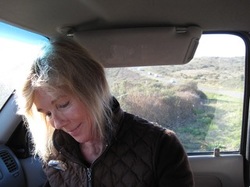Elizabeth Carothers Herron
|
Back to Issue 7 |
MemphisSleeping in the narrow bed in his study,
surrounded by his books, I think of my father’s hands, a scholar’s hands -- still, hands that fixed the toaster, hands that took apart and put back together. Through the open window on the clear cold wind after rain, the long whistle of a train coming closer, then passing. This morning beside his hospital bed – honey rose opening, the blessing of falling away from old hurt. The maw of grief already waiting, Love, I said, pretending I am not afraid. WishboneThey aren’t quiet, the dead. We hear
their clamor, words jammed and jostled, so we don’t know who’s talking and who’s talking back. From the four directions we gather our drawn limbs and our wits. The day reassembles itself in the singularity of each rock, each pair of eyes, a sunny sky. Well, here we are in the post-post world with its glassy silence. Our tongues have been mended, but what can we say? Most silent is Dear Innocence -- a barge for her laden with lilies, roses and rosemary. Look at her face, eyes wide as heaven in surprise. She’s dead! But she won’t shout with the others, whose interrogations and insults trouble even the dark. We close her eyes with a moonstone over each socket, so she will know the gaze of her own bovine love. We did the best we could for her. She wore you thin as a wishbone. She wore me thin as a whip. Dust of LifeBui doi they called the half-American
children of Vietnamese women, dust of life. I learned this the day I heard a baby was found alive in a trash compactor-- the same day a homeless man died when the dumpster he was sleeping in was picked up by the truck. Dumpsters are warm because decomposition is an active process. That might be what kept the baby alive. The homeless man slept perhaps like a baby. I lie awake and rummage the dust and refuse of my mind. It offers up what it can. Tonight I forgive myself for not being able to spin straw to gold or make shoes, or sing a baby to sleep. InstructionsLet a black dog lie at your hearth.
If a white dog comes to your door drive it off. Take gravel from the gullet of a cock and cook it with flour and suet. Shape a loaf to rise in the dark of the moon. When a stranger comes, slice the bread. If a crow nests in your hair throw away your comb. Throw away your heroic medals. Wrap your regrets with green ribbons and tie them to exit doors. Pray to trees. Sing to stones. Let your grief lie by the fire beside the black dog. Make it welcome. Do not turn away from it. Wrap your suffering in blue silk and let the tide take your tears. Remember all things come and go, come and go. When the fist of anger closes your heart, pull it out, wrap it in red twine and bury it under a rose bush to make strong thorns. If despair clings to you get up before dawn and think of those you love still sleeping. If longing aches, take aspirin. If worry stiffens your shoulders break the crust of your back and flap your arms like a homeless coat or the wings of a blackbird. If doubt darkens your hope flap them again. Think of kicking your legs to swim, kicking your legs to swing as high as the swing could go. Remember weightlessness. Let sadness see the sunrise. When you can’t sleep, go listen to the owls, for they are wise hunters with eyes in the back of their heads. When you weep for all that is lost remember rain. |
Elizabeth Carothers Herron’s poems appear in West Marin Review, Comstock Review, Canary, and Reflections. Her work has been supported by the San Francisco Small Press Traffic award, the National Endowment for the Arts, and the Mesa Writer’s Residency.
She has worked as a canner on the nightshift in a pineapple processing plant, a department store sales clerk, a chaplain for the police force, and a member of the faculty at Sonoma State University. Wild Duck Review, Columbia Review, Tri-Cycle, Orion, Parabola and various anthologies have also published her work; Report, a chapbook-length poem structured around weather, tides, and phases of the moon, was published by Richard Denner’s dPress in 2007. She has twice been nominated for a Pushcart Prize in poetry. |

